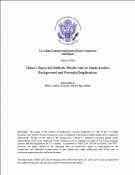×
Filter Results
Filter Results
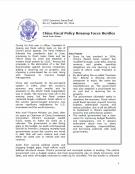
Issue Brief
Key Points:
Since its last overhaul in 1994, China’s flawed fiscal system has muddled through. Local debt, slowing revenue, and greater spending obligations are now spurring a new round of reform under President Xi Jinping;
By eliminating the so-called “business tax,” Beijing is allowing services companies to enjoy the same tax deductions and rebates manufacturers do. The government may also establish a price-based tax on coal and a recurring tax on property;
The government ultimately seeks to rebalance the economy. Fiscal reform could boost services, prevent housing bubbles, redistribute income, and reduce pollution. But it will be difficult to implement in China’s segmented economy and authoritarian system;
The central government has a clear vision for improving budget flexibility and transparency. Yet it remains ambivalent about how to share revenue, spending responsibilities, and borrowing authority with local governments.
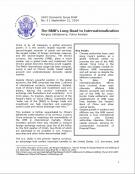
Issue Brief
Key Points• Chinese authorities have used Hong Kong’s position as a global financial center to promote the use of the RMB abroad. Hong Kong is the oldest and largest market for offshore RMB transactions, and will remain so despite the emergence of several other offshore contenders.
• To date, RMB internationalization efforts have involved three main channels: offshore RMB deposit accounts and bonds, use of the RMB for cross-border trade settlement, and establishment of RMB swap lines between the People’s Bank of China and other central banks.
• Despite growth in onshore and offshore use, the RMB cannot become a true international currency until Chinese authorities liberalize China’s capital account, allowing for unrestrained movement of financial flows.
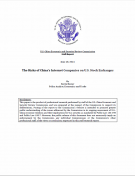
Staff Paper
In May 2014, Alibaba, China’s leading e-commerce website, filed for a U.S.-based initial public offering (IPO) in what is expected to be one of the largest in U.S. history. The highly anticipated IPO will be just one in a recent wave of Chinese Internet companies launching IPOs in the United States. The trend has raised some misgivings among U.S. regulators about the corporate structures of these companies. To bypass Chinese government restrictions on foreign investment in the Internet sector, Chinese Internet companies use a complex and highly risky mechanism known as a Variable Interest Entity (VIE).
An addendum was added to this paper on September 12, 2014.
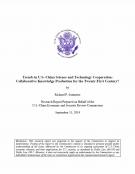
Staff Paper
This report examines 35 years of cooperation between the United States and China in the areas of science and technology (S&T) since the signing of the 1979 U.S.-China Science and Technology Cooperation Agreement.


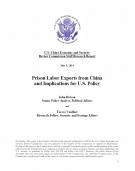
Staff Paper
Since the Commission’s examination in 2008 of prison labor issues in the People’s Republic of China (PRC), there has been little substantive reduction in the scale and scope of China’s broad network of prison labor facilities. These facilities, led by local officials, continue to produce goods intended for export on a potentially large scale, in violation of U.S.-China agreements on the exports of prison labor goods to the United States. Although U.S. representatives in Beijing have continued to engage with their Chinese counterparts regarding suspected prison manufacturing facilities, the pattern of long delays and minimal cooperation by officials in the PRC Ministry of Prisons persists. Further, it is unclear whether the recent abolition of “reeducation through labor” (RTL) and reported release of up to tens of thousands of prisoners will have a significant impact on the prison labor system and export of prison labor products.

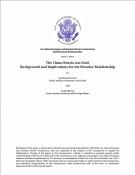
Staff Paper
On May 21, China signed a 30-year, $400 billion gas supply deal with Russia. The agreement concluded a decade of protracted negotiations, and coincided with an escalation of the Ukraine crisis in Europe. This paper examines the conditions, motives, and implications of the deal. It begins by looking at China’s energy needs and gas import strategy, as well as Russia’s Asia pivot. It then analyzes the key points of contention – the price, shipping route, and payment and investment conditions – and whether or not these were resolved in China’s favor. Section 3 places the deal in the context of Sino-Russian relations, in terms of geopolitics, economic ties, and a maturing energy partnership. The paper closes with implications for the United States, Europe, and Japan.

